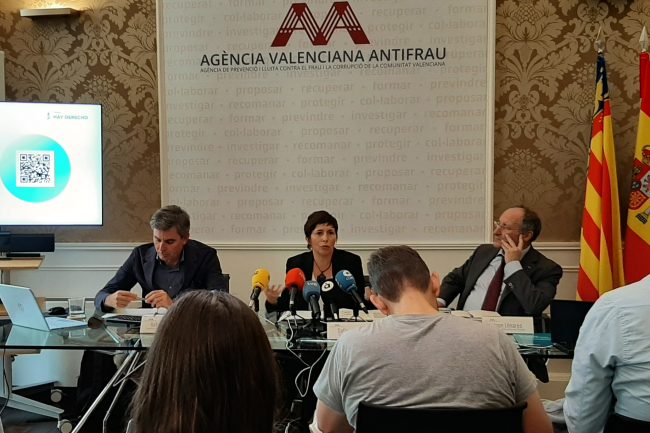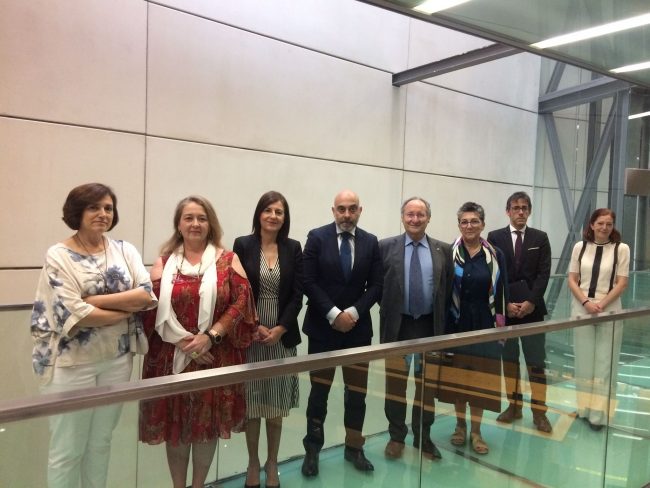The Hay Derecho Foundation presents “El Dedómetro” where it analyzes the level of politicization and cronyism in the appointment of the heads of 30 public entities of the Valencian Community
Valencia, June 8, 2023.- The Hay Derecho Foundation has presented at a press conference at the headquarters of the Valencian Anti-Fraud Agency the investigation that bears the name “El Dedómetro”.
This study is analyzed through the collection and analysis of public data, the curriculum of 66 heads of the main public entities of the Valencian Community in the last decade and under governments of different political signs. The final analysis reveals that 33 of them fail in terms of the principles of merit and ability, with less than a 5 on a scale of 1 to 10.
The result is part of the conclusions of a data research carried out by Hay Derecho that analyzes, in total, 101 CVs of management personnel of 43 public entities of two autonomous communities of opposite political sign: the Community of Madrid and the Valencian Community.
Hay Derecho, a non-profit organization that defends the rule of law and fights against corruption, has created indicators that, based on the collection and analysis of public data, allow evaluating whether the selection processes of the highest managers reflect the principles of merit and capacity or on the contrary it is cronyism and exchange of favors
For the analysis of the suitability of top managers, the methodology takes into account academic training, general and specific professional experience in the sector he directs, as well as management experience, time spent in the position and political linkage.
The research, which is called “The Dedometer”, highlights that the system does not establish objective, transparent and concurrent procedures to guarantee the principles of merit and capacity in its selection. And yet, these managers manage average budgets of 184 million euros of public money and have salaries of up to 220,000 euros per year.
Those responsible for managing public companies in key sectors such as transport, media or finance, among others, are exposed to very high levels of turnover, mainly linked to changes in government. In the Valencian Community, 3 entities stand out that have come to have between 5 and 7 different managers in a decade.
The Dedometer analyzes data between 2012 and 2022 and points to a slight improvement in the profile of the heads of public entities when governments lack an absolute majority. The very high turnover of managers is striking, which highlights that appointments and dismissals are linked to political cycles and not to management performance or other professional criteria.
The results, however, improve in the case of public entities that have a selection regulation that specifies the process and the type of professional experience required for the position. In these cases, the analysis of the Dedometer shows that there is a tendency to select candidates with a longer and specialized professional career, although unfortunately not always with greater management experience.
However, even in these entities, turnover does not decrease, except in cases where there are fixed periods of mandate.
Another key feature of the report is the analysis of compliance with transparency laws: only 6 entities fully comply with transparency regulations. 80% fail to comply with at least one of the legal obligations such as publication of accounting information, or the name and professional career of its chief executive, among other data. Even one of them, Economic and Business Spaces, with 4 employees and a budget of 94 million euros, does not even have its own website where to host the information that the law requires to publish.
The research reveals that 47% of entities do not publish their salaries, 33% do not show the curriculum of their top managers – or do so incompletely – and 13% do not publish accounting information.
“Behind an unpublished or incompletely published curriculum there is not only a legal breach, there may also be an intention to hide the trajectory of someone not too qualified or a purely political career,” says Javier Zamora, head of research at Hay Derecho.
“From Hay Derecho we believe that it is necessary to apply protocols that ensure the active and accessible publication of all information, establish a standardized CV model for public sector managers and hold the top manager responsible for compliance with transparency obligations,” says Safira.
Joan Llinares, director of the Agency, was also present at the press conference, who stated that “we want to thank the work developed by the Hay Derecho Foundation with the preparation of this study as it offers us a vision of what is happening in terms of the selection of management staff in the public sector and especially at a time like the current one in which the selection will proceed and appointment of new managers following the electoral processes”.
Hay Derecho has conducted such research before. In 2020, the first Dedometer focused on evaluating the General State Administration from a series of regulatory bodies and a sample of 36 entities belonging to the public business sector such as Correos, AENA, Red.es or Paradores. The results were: a high level of turnover, with entities that had up to 9 maximum managers during a period of 15 years, little experience in management and little experience in the matter of the maximum managers analyzed. Improved findings in independent authorities, which set specific requirements and mandates with fixed durations for their top managers
In the second research, the different entities of the Metropolitan Area of Barcelona were analyzed, evaluating not only those most responsible, but also their transparency.
The Hay Derecho Foundation is a non-profit, independent foundation that works to defend the rule of law, good institutional functioning and promote the fight against corruption.
Hay Derecho has recently joined the Consell de Participació of the Valencian Anti-Fraud Agency.





